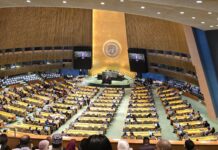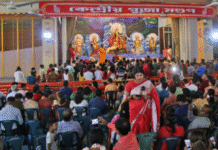

Indian External Affairs Minister S Jaishankar, expected to arrive tomorrow on a one-day visit, might carry good news, Foreign Minister AK Abdul Momen said yesterday.
“He may bring good news and surprise us. We don’t know exactly what that is… he will give a special message…,” he told reporters at the foreign ministry.
Quoting Indian Foreign Secretary Harsha Vardhan Shringla, the Indian media on Monday reported that Jaishankar would carry an invitation letter from Indian Premier Narendra Modi for Bangladesh Prime Minister Sheikh Hasina to visit India.
Indian Foreign Secretary Vinay Mohan Kwatra will accompany Jaishankar.
“This is good news. Relations between India and Bangladesh are very warm. We want continuous engagement with our neighbours… I am very happy that the Indian foreign minister is coming to Bangladesh. I welcome him.”
Jaishankar will call on Hasina and then hold a meeting with Momen.
Asked what would be on the agenda, Momen said they would discuss the dates of meetings of the Joint Consultative Commission and the Joint River Commission, as well as the long-pending Teesta water agreement, border killings, and India’s imposition of anti-dumping duty on Bangladesh’s jute, among others.
Momen didn’t give a direct answer to a query on whether he had any conversation with Jaishankar on the US sanctions on Rab during his visit to Washington DC in early April when the Indian foreign minister was also visiting the US capital.
Following the US sanctions on December 10 last year, Bangladesh sought India’s help for its withdrawal and got assurance from New Delhi that it would raise the issue with the US, said Momen.
Asked how right it was for Dhaka to seek New Delhi’s help over the issue, Momen said, “…We consult on various issues.”
On US Ambassador Peter Haas’ clear articulation that there is no scope for repealing sanctions on Rab without accountability, he said, “That’s ok. We have already taken some steps.”
The US spoke about accountability and Bangladesh has an in-built mechanism for that, the minister pointed out.
He made mention of the 2014 seven murder case in Narayanganj where Rab members were involved, and said a number of Rab officials were executed following a court verdict while many lost jobs and got demoted.
“Such information does not reach them [US]. Those who oppose us only talk of the killings, not its context.”
Asked if the US is satisfied with Dhaka’s explanation, Momen said, “May be not yet, but they will in the future.”
On the issue of “Chinese debt trap” that has come into discussion with regard to Sri Lanka’s financial crisis, Momen said, “We hear you [journalists] talk about the Chinese debt trap. But later we find out that the things you talk about are imaginary.”
He said Chinese loans account for only 5-6 percent of Bangladesh’s total foreign loans, while the majority of loans from multilateral organisations like World Bank and Asian Development Bank. A large chunk of bilateral loans comes from Japan.
“We are very cautious about taking loans. We don’t borrow if the loan is not beneficial.”
About the US Commission on International Religious Freedom’s annual report that expressed deep concern over “deterioration” in religious freedom in Bangladesh and other South Asian countries, he said there is no discrimination when it comes to religious groups in Bangladesh.
“There may be some incidents but the government takes action.”









